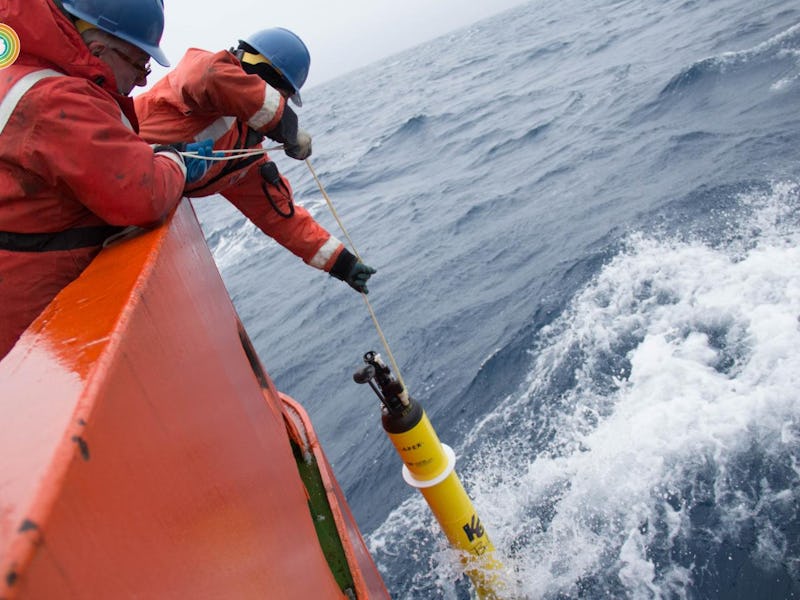A Fleet of Diving Robots Discovered Surprise Carbon Emissions Off Antarctica
Bad news, yes. But bad news found in a really cool new way.

Over a hundred, cylindrical, submersible drones, diving and recording acidity data from the seas around Antarctica, have found some unexpected new climate data. Long thought to be a net absorber of carbon dioxide, the Southern Ocean, it turns out, does not always act that way.
Up until the new study, published Tuesday in Geophysical Research Letters, flux estimates on the uptake of carbon dioxide by the Southern Ocean were pretty sparse — and weighted heavily toward the summer months, when travel is safer and the water more readily assimilates atmospheric carbon. Winter measurements have traditionally come from ships traveling to resupply Antarctic research stations (like the one in John Carpenter’s The Thing. Just saying).
What that means is this fleet of little robots were the first to probe this icy and remote ocean’s winter behavior in earnest.
A summer image of Antarctic sea ice in the Southern Ocean, taken by University of Washington postdoctoral research associate Hannah Zanowski.
The specific type of floating robots used, which collected data through the Southern Ocean Carbon and Climate Observations and Modeling (SOCCOM) project based at Princeton, were similar to a preexisting network of aquatic probes, called Argo floats, albeit a little more advanced.
While Argo floats — managed internationally by about 30 participating nations — only take ocean temperature and salinity measurements, these new SOCCOM floats were equipped with sensors to record additional information, including the amount of dissolved oxygen nearby, the nitrogen content and acidity (pH).
The new paper used the pH measurements as an indicator of ocean acidification and thus as a means of inferring the amount of dissolved carbon dioxide present within the waters of the Southern Ocean (or in the case of these winter readings, carbon dioxide that was curiously absent).
“After four years of SOCCOM, the vast majority of information about the chemistry of the Southern Ocean is coming from these floats,” the new paper’s lead author, University of Washington oceanographer Alison Gray, said in a statement to UW News. “We have more measurements from the past few years than all the decades that came before.”
A map of the area covered by the study's robotic floats in the waters off Antarctica. The regions shaded in dark gray represent land, while the light gray regions represent sea ice. It was the drones along the dark orange paths, in the 'Antarctic Southern Zone,' that discovered the evidence of higher-than-anticipated carbon dioxide emissions.
The findings are a little disturbing and slightly mysterious (again, just like the events in John Carpenter’s The Thing; just saying) — particularly in their suggestion that climate scientists have been overestimating the Southern Ocean’s abilities as a natural sink for extracting atmospheric carbon.
“We find that the Southern Ocean is currently near neutral with respect to removal of carbon from the atmosphere, contrary to previous studies,” Princeton geoscientist and SOCCOM director Jorge Sarmiento said in a statement. “These results can be reconciled if there is a corresponding unobserved carbon uptake waiting to be discovered somewhere else in the ocean.”
If you have any leads on what’s happening to all this extra CO2 (particularly if you have any evidence that the carbon sink involves murderous, plant-based monsters like in the original 1951 version of The Thing), please contact us.
A SOCCOM float decorated by Steven Son Middle School students, as part of Princeton's Adopt-a-Float program.
The robots’ findings “came as a really big surprise” to Gray who noted that “previous studies found that the Southern Ocean was absorbing a lot of carbon dioxide.”
“If that’s not true, as these data suggest,” she said, “then it means we need to rethink the Southern Ocean’s role in the carbon cycle and in the climate.”
Antarctica can be an unpredictable place, according to Derek “Deke” Arndt, the chief of the Monitoring Branch for the National Oceanic and Atmospheric Administration’s (NOAA) National Centers for Environmental Information.
“Its behavior can be extreme,” Arndt tells Inverse, “and it can be extreme in both the warm and the cool directions.” (While Arndt was not affiliated with the diving robot research, the NOAA did contribute support for the project, as did NASA. The majority of the $21 million in funding came, however, from the National Science Foundation’s Office of Polar Programs.)
Correction: An editing error misattributed a press release quote from Alison Gray to Derek Arndt. It has been amended.